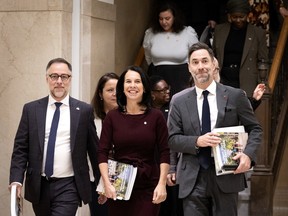The $7.28-billion budget will increase the average residential tax bill by 2.2 per cent, and it contains about $100 million in measures to alleviate the housing crisis.

It’s her eighth and final budget as mayor of the city.
At city hall on Wednesday, Montreal Mayor Valérie Plante introduced the 2025 budget, saying she was proud to stand behind it.
It contains about $100 million in measures to alleviate the housing crisis, which is $47 million more than last year.
Plante said that since her Projet Montréal assumed power at city hall in 2017, nearly $1 billion has been earmarked to deal with homelessness.
“To anyone who wants to be mayor, there is no coming back,” Plante said. “Investing massively in housing and making it a real department of its own, I think is a great thing.”
She’s also proud that despite some difficult years of spending, the level of city services have remained about the same.
Asked which budget was the most difficult since she was elected, Plante said she is proud of all the budgets she tabled during her two terms.
“It’s like trying to (choose a favourite) kid, and I only have two kids,” Plante said with a laugh.
However, after eight years with Projet Montréal, it’s clear that expenses are rising higher than the rate of inflation. Since Plante took power, expenses ballooned by 32.4 per cent — when the rate of inflation was closer to 20 per cent over that time.
Before Plante took power, property owners in the city of Montreal were paying an average of $3,611. The budget for 2025 — which has yet to be ratified in a vote by city council — proposes an average tax bill of $4,995 for the residential sector. That’s an increase of 38.3 per cent over that time.
While that may sound alarming, it is worth noting that expenses in the city of Vancouver’s budget increased by nearly 70 per cent over the same period. Vancouver residents will also pay 5.5 per cent more in property tax in 2025. In Toronto, expenses rose by 54 per cent between 2018 and 2024, and the average property tax bill is about $2,000 higher than in Montreal, and they increased at a higher rate this year — with an eight-per-cent hike for 2024.
Cities are tackling far more issues than they did in the past, Plante explained, many of which are outside their traditional domains of competence. She cited expenses on tackling homelessness and adapting the infrastructure to climate change as examples. Others include dealing with the COVID-19 pandemic and a crisis in funding public transit infrastructure.
“I feel like I navigated through quite a lot of crises during my two mandates as mayor,” Plante said. “I think in the upcoming years, it’s going to be more and more difficult for cities … because climate change isn’t going to stop, and the numbers show we’re going to see more homelessness in the next two to three years. I don’t want to scare the next mayor who is going to come in, but there are challenges.”
Plante said she’s leaving the next mayor with a financial house that is in order, even though debt payments continue to rise. The city’s ratio of net debt to expenses continues to hover above 100 per cent — a phenomenon that began with the Plante administration. In 2025, the debt ratio is forecast to reach 107 per cent, down from an estimated 108 per cent in 2024. Executive committee president Luc Rabouin said the city is on target to meet its stated goal of bringing that ratio down to 100 per cent by 2027.
“The plan is very easy to understand,” Rabouin said. “All our investments are planned to meet this commitment, and we just have to continue this strategy.”
The opposition, however, said it’s clear the legacy of the Plante administration is a financial mess.
“The house is far from in order, and after seeing this budget, it is clear why Valérie Plante decided to leave, because of the city’s sagging finances,” said Aref Salem, the interim leader of opposition Ensemble Montréal.
Alan DeSousa, St-Laurent’s borough mayor and the opposition spokesperson for finance issues, questioned the efficacy of Plante’s spending on homelessness.
“I question those moneys because none of that has delivered any results,” he said. “If you would have spent $1 billion in homelessness, we would have felt it. They may have tagged money, but it hasn’t gone anywhere. We see it in the lack of housing, we see it in our streets. We see it in our métros and mass-transit systems. That money hasn’t been spent and we haven’t seen the results.”
The opposition also dismissed the $3.3 million more in funding for non-profits as mere crumbs.
Tax bills only make up a portion of the amount the city used to balance its budget. The 2025 budget includes more revenue in transfer payments from Quebec — which includes a percentage of the provincial sales tax. It also increased its revenues from fees and special taxes levied on citizens, among them a tax on vacant properties, which is doubling in 2025. The city also received $40 million more from the so-called welcome tax, the amount charged on real-estate transactions.
Among the expenses, the city’s payments to the Autorité régionale de transport métropolitain for public transit is increasing by $47.2 million — 6.6 per cent more than last year. The city is also paying $2.3 million more than it expected to allow seniors across the island to ride transit free — a 13-per-cent increase. That’s because of the popularity of the measure, which allows anyone over 65 to obtain a transit pass that can be used on all modes within the island of Montreal.
Debt financing will cost $27.2 million more in 2025, and the boroughs received an increase to their budgets worth $24.1 million.